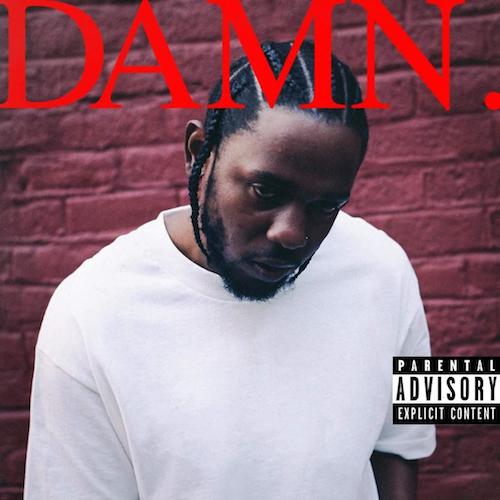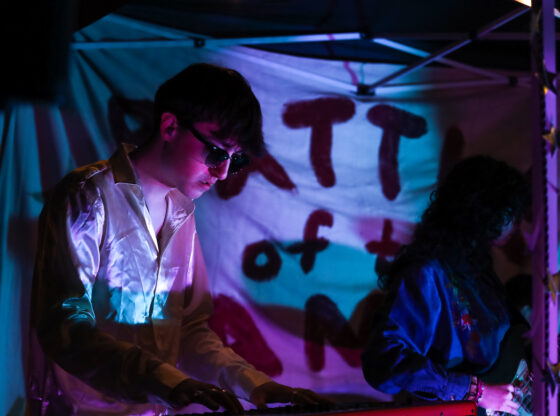Kendrick Lamar’s fourth album, “DAMN,” is a sprawling yet sparse masterpiece that blends layers of introspection with Lamar’s typical political, topical and religious themes. Foregoing the classic hip-hop storytelling of his commercial debut, “Good Kidd, M.A.A.D City,” and the jazz/funk inspired poetic political diatribe of “To Pimp a Butterfly (TPAB),” “DAMN,” is something completely different from anything Lamar has produced and different than anything else in the hip hop world.
“DAMN” is a project of duality, a constant theme in Lamar’s work. “A Gemini, duality personalities always conflict in me,” he raps on “untitled 06” from his b-side LP “untitled unmastered.” Throughout the record he grapples with issues of competing emotions: lust and love, humility and pride, faith and fear, life and death.
Less broad in its reach than his previous albums, “DAMN” is a journey through the mind of a man who feels stuck between being a saviour for his people, his home and the fickle rap industry and being an eternally damned soul in the eyes of the universe. This duality is also felt sonically in the music, which switches between hard hitting, trap-inspired beats paired with Lamar’s violent flow and dreamy tracks that find Lamar sharing more sing-songy verses with collaborators such as Rihanna, and the new-to-the-scene falsetto of Zacari.
The lyrics in “DAMN” are more direct and visible in meaning than Lamar’s previous album. This is not to mean that the album lacks vivid symbolism and metaphorical language, but it relies more on its direct diction and shots at everyone ranging from “wack artists” to the figureheads of Fox News and the Commander in Chief himself, than on deeply complex metaphors.
The jazz production of “TPAB” is replaced on “DAMN” with experimental, direct beats that range from the hard knocking trap, audio panning beat of “DNA” or “HUMBLE,” to the Steve Lacy-produced, Mac DeMarco vibe inducing “PRIDE.”
The album is less angst and anger than it is meditating spirituality and self reflecting disquiet. The tunes shift sonically throughout the album, ranging from the late summer night driving song “LOYALTY ft. Rihanna,” to the experimental (the beat’s centerpiece is an alarm clock-esque siren) hard hitting lyrical malaise “XXX (ft. U2),” to the boom-bap and guitar backed three parted storytelling of “FEAR. ”
The album might not share the musical complexity and funk inspiration of TPAB, but it matches the award winning 2015 album in terms of lyrical content. The first track, “BLOOD,” combines lush production with a spoken word segment by Lamar that finds him being shot (the gunshot punctuates the song), before fading into a clip from a Fox News segment where the reporters criticized Lamar’s hit 2015 song and the eventual anthem of the Black Lives Matter movement, “Alright.”
The reporter’s critique of Lamar is quickly responded to in the hardest hitting song off the album, “DNA,” which sees Lamar exploring the duality inherent within his own views of his blackness and that of society’s. “I got power, poison, pain and joy inside my DNA,” he rattles off in double time flow.
He switches between personal accounts and attacks against the establishment he sees as purveyors of prejudice and hate towards the black man. The schizophrenic “XXX,” which features the unexpected appearance of Irish band U2, dives further into the political and social themes of the album, finding Lamar rapping a verse in which he pushes a friend (whose son was recently killed) to incite violent revenge, in opposition to Lamar’s usual peaceful demeanor.
In the second verse following the U2-provided bridge, he critiques the political climate in America today and provides the world context for his push towards violence. In the second verse he raps: “But is America honest or do we bask in sin?/Pass the gin I mix it with American blood.” It’s a striking, paradoxical song that harkens back to Lamar’s 2015 song, “The Blacker the Berry,” in which Lamar rapped that he was “the biggest hypocrite of 2015” for decrying black on black gun violence when he engaged in it himself.
On “FEAR,” which might serve to be the centerpiece and defining lecture of the album, Lamar brings us on a three-part journey through his life and the constant emotion of fear. At seven, he fears the exhaustive authority of his parents, at 17, he fears death at the hands of his peers or the police and at 27, he fears losing all he has earned in life and being judged as a reflection of himself, his family and his city.
After the three vignettes of his life, Lamar fires off a verse in which he raps maybe one of the most striking poetic messages of his career: “Fear, what happens on Earth stays on Earth/And I can’t take these feelings with me/So hopefully they disperse/Within fourteen tracks, carried out over wax/Wonderin’ if I’m livin’ through fear or livin’ through rap.”
These lines define an album that serves in under 55 minutes to showcase a troubled yet celebratory artist at the top of his game and an artist that will have an impact for untold years to come.











